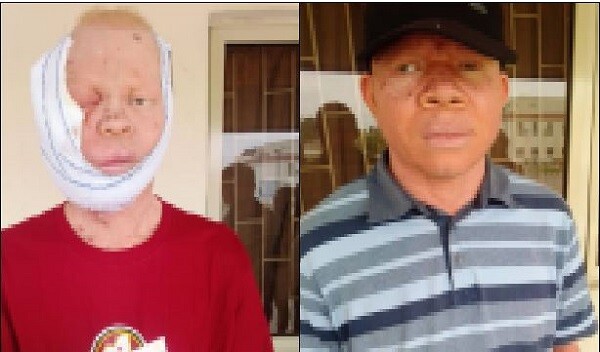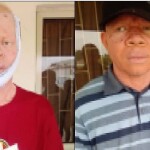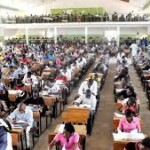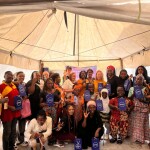A vulnerable community reels under vicious attacks from skin cancer, blindness, and others. And the law is too lame to defend them
Gbenga Ogundare
Every day, Abdulazeez Lateef goes about the streets of Lagos with a conspicuous gash on his forehead, and a growing worry about how to get rid of the festering sore before gangrene sets in and the ravages spread to other parts of his pale skin.
As a person with albinism, Lateef has reasons to be anxious. His sore is the result of Solar Keratosis, a pre-cancerous lesion that is caused by sun-induced DNA damage to the skin.
In people with albinism like Lateef, explains Dr. Folakemi Cole-Adeife, Consultant Physician and Dermatologist at the Lagos State University Teaching Hospital (LASUTH), such lesions often progress to skin cancer—either as squamous cell carcinoma or basal cell carcinoma of the skin.
Skin cancer, like other form of cancer conditions, if left untreated, warns the Dermatologist, can result in death.”
Given their susceptibility to freckles and other sun-induced lesions, “many of them require surgery for skin cancers’, laments Dr. Cole-Adeife, ‘but cannot afford it.”
That’s the kind of unsettling doom the Lagos State Government promised to stave off in 2010 when it conceived the Lagos State Special People’s Law.
Section 32 subsection 2 of the LSSPL actually provides that: “Persons living with disability shall be entitled to free medical and health care services in all public health institutions.”
Lateef’s hope of a free healthcare at LASUTH is forlorn and dim now, despite the generous LSSPL provisions.
His sore, Lateef reveals to this reporter, has festered on his forehead for four years on the trot now. And doctors at LASUTH will not assuage his pains with any prescription, he gripes.
“My experience trying to access healthcare is a bitter one … So I’m currently treating myself with Beecham Ampliclux just to get rid of the wound.”
Shorn of a paid employment, and clueless about how to get the doctors at LASUTH to respect the disability law, Lateef’s resort to self-help seems an only option. Only that he may never experience a let-off from his self-medication efforts afterall, hinted Dr. Cole-Adeife.
“If the man’s sore has been there for a long time, it may have progressed to skin cancer.
“The treatment options for such skin lesions often involve surgical removal and that may be why no drugs were prescribed.”
A community under attack
Physical distancing or not, persons with albinism hardly can survive a day without some form of complications.
Whenever they are not contending with cultural biases and negative social stereotypes, a syndrome of health challenges, largely induced by exposure to the sun, also present a multitude of complex threats to their lives.
Ademola SA. in his study: An analysis of skin cancer in albinos in Ibadan, for instance, recommended that Albinos in Nigeria should be exposed to public health intervention to reduce the incidence of skin cancers through targeted public health educational programs; structured multicenter and population based research, surveillance, and improved access to healthcare.
A ruse of law
According to the World report on disability, persons with disabilities are more likely to be denied care and have poorer health outcomes than persons without disabilities, even though households in low- and middle-income countries with disabled members spend a third more of their income on health care compared with other households.
The grim World Report notwithstanding, Prof. Akin Abayomi, Commissioner for Health in Lagos, would not pick the reporter’s several calls, neither would he respond to sms and whatsapp messages sent to his mobile number 09031101982.
But access to free healthcare in the public health facilities scattered across Lagos would appear so easy-peasy listening to Barrister Babatunde Safiu, Legal Officer at the Lagos State Office for Disability Affairs (LASODA).
“All a person with disability needs to do is to present his certificate of disability or identity card issued by the Lagos State Office for Disability Affairs to any public hospital.”

But after several futile attempts to activate Section 32 of the LSSPL to her advantage, and the loss of an eye to complications arising from albinism-related disease condition in the process, Victoria Adesanya is certain “the Lagos State Special Peoples Law is not working,” and Persons With Albinism may never get the improved healthcare Ademola recommends in his study.
“The doctors at LASUTH are making it worse for us with their indifference to our plights each time we visit the hospital,’ cries Adesanya.
It’s an unflattering verdict actually, and Adesanya thinks she has every reasons to wax emotional.
“There was a time I fell down In a gutter, when I got to the emergency department at LASUTH, I was told to buy some drugs in addition to undergo a series of test. Unfortunately I didn’t have any money on me at that time.
“When I was asked to pay and I reminded them that it ought to be free because the disability law says so, they told me that they are not aware of the law I was referring to. So they insisted I pay if I wish to be treated,’ she laments to the reporter.
Both Bolaji Adebesin and Oluchi Chukwu have also stopped trying to activate their rights to free healthcare services as enunciated in the LSSPL. Not only that, they are also in a quandary now after paying huge sums of money for a surgery that failed to halt the spread of their skin cancer.
“I don’t have anyone to run to for help again,’ Adebesin cries as he narrates his ordeal in the throes of a malignant cancer and the unyielding doctors at LASUTH, ‘my aged mother is my only hope and she has wasted all of the money she could borrow on the first operation.”
To get the doctors at the General Hospital in Gbagada to put him under the knife in 2019, Adebesin was compelled to part with N250,000. “I also paid N2500 per day for bed space, and another N700 per day for feeding,’ the 45-year-old man discloses.
By the time he was discharged six weeks later, Adebesin had racked up N112,000 as charges for the bed space he occupied at Gbagada General Hospital, and another N31,000 as cost of feeding. Put together with the charges for surgery, Adebesin and his old mother were already indebted to the tune of N393,500, minus the cost of drugs and other therapies.
But the ordeal was far from over for Adebesin. He was again referred to the Lagos University Teaching Hospital (LUTH) for a session of chemotherapy. “I was charged another N300,000, but could not get the money,’ he narrates.
He has a marching order to raise the money for the chemotherapy now because the cancer has started spreading again, ravaging his face in the process, and causing his head to be swathed in large bandage.
Chukwu is equally indebted too, after borrowing to pay for his surgery at the general Hospital in Marina Last year. Now stranded, he’s got no one to approach for another loan so he could go through chemotherapy treatment at LUTH like Adebesin.
“They asked me to pay N20,000 before I was allowed to see the doctor initially, and after then, they told me to go and do a scan and other tests before the chemotherapy. But I have not been able to get the money since then.”
In charity they trust
As he battles another cancer metastasis, Chukwu could only pray for a messiah. He found one last month. A N20,000 cash gift from Dr. Cole-Adeife who wished her intervention was never discussed . “This is not the norm,’ she explains to the reporter, ‘we only help a few of them with some funds on some occasions and we do not wish for them to be mentioned.”
Chukwu wasn’t the only beneficiary of that humanity. Adebesin got N35,000 and Rosemary was also given N20,000.
Perplexed and stranded, persons with albinism in Lagos hardly can resist the urge to seek succor in the legacy of late Professor Frances Ajose, a renowned dermatologist, and mother of Dr. Cole-Adeife.
“My mother had great passion for people with albinism,’ Dr. Cole-Adeife said of the late Prof. Mrs Ajose, ‘and spent a lot of her time, effort and resources educating them on how to take care of their skin and highlighting their challenges to the society and the government.”
So Dr. Cole-Adeife naturally inherits her mother’s humanity, and that continues to spur her to lavish personal funds and medical expertise on the albino community in Lagos, even after her mother passed on.
Timothy Akande and several hundreds of persons with albinism in Lagos still struggle daily to access urgent skin and eye care all the same, investigation reveals. A large number of them suffering from employment inequality, and neck-deep in poverty.
“This is why we are advocating for free or subsidized topical and surgical treatment for skin cancers in people with albinism in public hospitals, both at the state and federal levels,’ Dr. Cole-Adeife explains.
The flaws in the law
Prof Adetokunbo Fabamwo, Chief Medical Director (CMD) at LASUTH has a foreboding about the feasibility of a free healthcare though.
“So, who is supposed to pay for their Medicare?”
Not only that, the obstacle to the advocacy for a free healthcare would also be the ambiguity inherent in the law this community flaunts in the faces of doctors at LASUTH, and many other public health facilities in the state, the reporter finds out.
Section 32 of the LSSPL provides for free healthcare for PLWDs indeed, but the categories of disease conditions that qualify for free medical intervention are clearly absent.
This then provides a water-tight alibi for hospital management and their doctors to disregard any dying Albino with cancer condition trying to access surgical removal using the disability law as a bill of right.
At any rate, argues the LASUTH CMD, “The concept of free health is archaic. Somebody has to pay.’ And ‘I am not aware of any dedicated fund to look after them.”
Grim numbers for grim health
The promise of a free medical intervention for PLWDs in Lagos is a sham afterall. Analysis of allocations to the Health Ministry from 2015 to 2019 shows a less-than-serious commitment on the part of the state government.
Of the N489,690,000,000 appropriated in 2015, only N32,385,860,350, or 6.60 percent of the total budget was allocated to the Health Ministry, both for capital projects and recurrent expenditures.
According to the National Bureau of Statistics (NBS), estimated population of Lagos as at 2015 was 12,155,337. By simple calculation, each resident thus had N2,664 to spend in government hospitals suppose they were knocked down by some infirmity that year.
Not the several hundreds of thousands that a person with albinism down with a skin cancer requires to go through surgical procedures and chemotherapy.
In 2016, the total budget for the state was N662,588,000,000, out of which N39,599,604,697, or 6. 0 percent of the entire appropriation was allocated to the Health Ministry.
Again using the 2016 NBS population estimates of Lagos which stood at 12,550,598, a resident, including albinos in dire need of surgical procedures, had only N3,155 to cater for their health emergencies.
The state had a total of N812,998,000,000 as budget for the 2017 fiscal year. And of this, the Health Ministry got N37,115,678,085, or 4.60 percent of the whole as allocation.
Again the metro area population of Lagos in 2017 was 13,042,000, meaning that each had N2,846 to address their health needs were the health budget for that year shared among the residents.
The total state budget for Lagos in 2018 was N1,046,121,000,000, out of which N 55,149,754,185, or 5.30 percent was allocated to health.
Total appropriation for 2019 dipped to N873,532,000,000, allocation to health was however N67,969,666,341, or 7.80 percent of the whole.
If the capital and recurrent health budgets for the two years were to be rationed among a population figure of 13,463,000 in 2018, and 13,904,000 in 2019, each residents would then have N4,096, and N 4,888 respectively to cater to their health challenges in the state health facilities.
The is a way out of the quagmire though, Fabamwo insists. The solution is “the provision of a pool of funds to look after them.”
“Various organizations can donate including government.
Luckily the state health insurance scheme is here. We can also advocate that government pays all or part of their premiums so that they can access health.”
Room for improvement
That sounds like a sensible thing to do actually. Especially if government at the state and federal levels are serious about not leaving PLWDs behind as far as Nigeria’s Universal Health Coverage (UHC) commitment is concerned.
In developed societies where political commitment is in full throttle, countries are adopting UHC strategies—such as establishing packages of essential health services and implementing health financing reforms—in an effort to ensure their citizens enjoy access to basic health care services.
March 2011, for instance, the newly elected coalition Government for Ireland announced, in the Program for Government, that “This Government will introduce Universal Health Insurance with equal access to care for all. Under this system there will be no discrimination between patients on the grounds of income or insurance status.
It was also specified that “Insurance with a public or private insurer will be compulsory with insurance payments related to ability to pay. The State will pay insurance premia for people on low incomes and subsidise premia for people on middle incomes.
In Nigeria, however, governments at all levels are yet to deliberately include their disabled subjects in the design and implementation of UHC strategies and reforms.
This clearly negates the provision of Article 25 of the United Nations Convention on the Rights of Persons with Disabilities, which Nigeria has ratified.
Article 25 of the CRPD states that “persons with disabilities have the right to the enjoyment of the highest attainable standard of health without discrimination on the basis of disability”.
A combination of tax-based financing and insurance-based model, as seen in other climes, would appear perfect for the disabled community across Nigeria.
But the potential benefits of these models could also be undermined by the possibility of under-funding, and failure to accommodate the full range of needs and services as required by PLWDs.
• First published under a different title, this story was done with the support of BudgIT and the Civic Hive Media Fellowship







